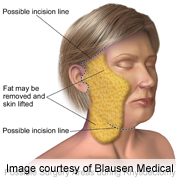
THURSDAY, Feb. 9 (HealthDay News) — A growing number of Americans are getting advice and information about facial plastic surgery from social networking sites rather than friends, a new survey indicates.
About 42 percent of patients in 2011 got information from social media such as Facebook and Twitter, a substantial increase from 29 percent of patients in 2010. The number of patients who sought information from friends fell from 63 percent in 2010 to 48 percent last year.
The findings are from the American Academy of Facial Plastic and Reconstructive Surgery’s (AAFPRS) annual poll of member surgeons.
“We are encouraged by the possibilities that Facebook, Twitter and other social channels offer for prospective patients, but urge all patients to exercise caution in researching facial plastic procedures to ensure information is from a reliable source,” academy president Dr. Tom Wang said in an academy news release.
“There’s a great deal of misinformation out there, and the best way to circumvent that is to consult an AAFPRS physician who is qualified, experienced and trained in performing facial plastic procedures,” he added.
The survey also found that Botox and hyaluronic acid injections were the most common nonsurgical procedures in 2011, while rhinoplasty (nose modification), blepharoplasty (eyelid modification), ablative skin resurfacings and facelifts were the most common types of surgical procedures.
Among the other findings from the new survey:
- 70 percent of patients requested procedures by describing the area of concern rather than asking for a specific product or procedure by name.
- Nonsurgical procedures were more common than surgical procedures.
- 63 percent of procedures were cosmetic rather than reconstructive.
- For the third year in a row, women had more surgical and nonsurgical procedures than men, with the exception of hair transplants.
- Among different ethnic/racial groups, the most common cosmetic procedures were rhinoplasty for blacks and Hispanics, blepharoplasty or rhinoplasty for Asian Americans, and rhinoplasty and facelift for whites.
- Only 14 percent of surgeons said they saw an increase in requests for “celebrity procedures,” such as wanting Angelina Jolie’s lips.
More information
The U.S. Department of Health and Human Services has more on cosmetic surgery.

